
Namhafte Fachleute aus Wissenschaft und Praxis präsentieren das Grundlagenwissen der Personalpolitik hinsichtlich der (Un-)Gleichbehandlung von Frauen und Männern. Die 6. Auflage wurde vollständig überarbeitet und um aktuelle Themen erweitert, wie z.B. Frauen in Aufsichtsräten, Gender Pay Gap in Führungspositionen, die entgeltpolitischen Prüfinstrumente Logib(-D) und eg-check.de, Diversity Management in der öffentlichen Verwaltung sowie betriebliche Erfahrungen mit dem AGG.
Aktualisiert: 2023-07-03
Autor:
Sünne Andresen,
Manfred Auer,
Sissi Banos,
Nina Bessing,
Kay Blaufus,
Annelise Burger,
Carola Busch,
Barbara David,
Gudrun Dilg,
Michel E. Domsch,
Sonja Dudek,
Céline Freund,
Marianne Geisser,
Jochen Geppert,
Astrid Gieselmann,
Bettina Graue,
Rainer Gröbel,
Michael Gümbel,
Christoph Habermann,
Axel Haunschild,
Ellen Hilf,
Elke Holst,
Monika Holzbecher,
Monika Huesmann,
Hans Jablonski,
Heike Jacobsen,
Andrea Jochmann-Döll,
Christiane Jüngling,
Rosemarie Kay,
Beate Kessler,
Alexander Klose,
Gudrun-Axeli Knapp,
Susanne König,
Sandra Konstatzky,
Gertraude Krell,
Désirée Ladwig,
Sandra Lewalter,
Annett Losert,
Christine Lüders,
Kathrin Mahler Walther,
Andrea Maiweg,
Andreas Merx,
Bärbel Meschkutat,
Christine Morgenstern,
Ulrich Mückenberger,
Sonja Nielbock,
Ingrid Nikolay-Leitner,
Marion Olthoff,
Renate Ortlieb,
Andrea Puschmann,
Daniela Rastetter,
Birgit Reinhardt,
Eva Maria Roer,
Monika Rühl,
Thomas Sattelberger,
Dagmar Schiek,
Julia Schimeta,
Oliver Schimmelpfeng,
Friedel Schreyögg,
Monika Schulz-Strelow,
Ursula Schwarzenbart,
Barbara Sieben,
Sandra Smykalla,
Hilde Stockhammer,
Karin Tondorf,
Günther Vedder,
Heike Welte,
Regine Winter,
Jutta Wolf,
Artur Wollert
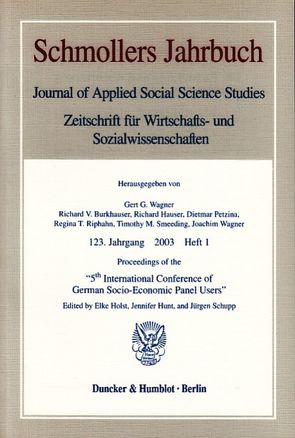
The papers in this special issue of Schmollers Jahrbuch provide a flavor of the work being carried out by the four hundred research teams registered as users of the German Socio-Economic Panel (SOEP). They were presented at the Fifth International Conference of SOEP Users, held in Berlin on the 5th and 6th of July 2002, and represent several fields of social science as well as many countries.
A first set of papers analyzes wage and income inequality and mobility. A new method measuring mobility in different parts of the income distribution is presented in one study, while a second proposes a decomposition technique to investigate changes in wage inequality. A third paper tests hypotheses about the nature of the welfare states by analysing income mobility in three countries: Germany, the Netherlands and the United States.
A second set of papers examines transitions to and from unemployment. They analyze determinants of new job-finding and unemployment duration, including the importance of psychological factors. Aspects of wage determinants play a role in several other papers, for example the negative correlation between maternity leave and the mother's subsequent wage. Another issue related to wage analysis the possible bias arising from individuals' not responding to the wage question.
An additional group of papers revolves around the theme of changes in labor force or personal status and changes in income, documenting, for example, the fall in real equivalent income experienced by women who become widowed. A final group of papers exploits various features of the SOEP to examine topics like savings behavior, wage subsidy schemes and their effect on employment, and the relation between the time a child's parents spent caring for him or her and the child's success at school. Finally, an interesting paper examines smoking behavior over the life cycle across four countries.
Aktualisiert: 2023-06-20
> findR *
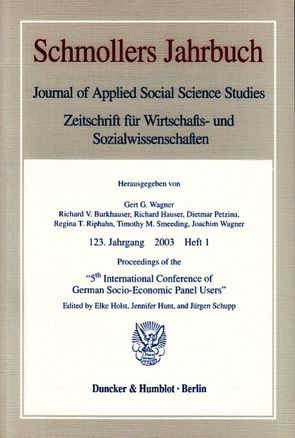
The papers in this special issue of Schmollers Jahrbuch provide a flavor of the work being carried out by the four hundred research teams registered as users of the German Socio-Economic Panel (SOEP). They were presented at the Fifth International Conference of SOEP Users, held in Berlin on the 5th and 6th of July 2002, and represent several fields of social science as well as many countries.
A first set of papers analyzes wage and income inequality and mobility. A new method measuring mobility in different parts of the income distribution is presented in one study, while a second proposes a decomposition technique to investigate changes in wage inequality. A third paper tests hypotheses about the nature of the welfare states by analysing income mobility in three countries: Germany, the Netherlands and the United States.
A second set of papers examines transitions to and from unemployment. They analyze determinants of new job-finding and unemployment duration, including the importance of psychological factors. Aspects of wage determinants play a role in several other papers, for example the negative correlation between maternity leave and the mother's subsequent wage. Another issue related to wage analysis the possible bias arising from individuals' not responding to the wage question.
An additional group of papers revolves around the theme of changes in labor force or personal status and changes in income, documenting, for example, the fall in real equivalent income experienced by women who become widowed. A final group of papers exploits various features of the SOEP to examine topics like savings behavior, wage subsidy schemes and their effect on employment, and the relation between the time a child's parents spent caring for him or her and the child's success at school. Finally, an interesting paper examines smoking behavior over the life cycle across four countries.
Aktualisiert: 2023-06-20
> findR *
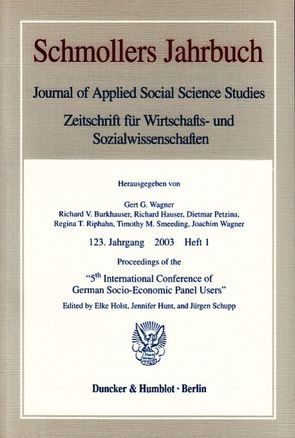
The papers in this special issue of Schmollers Jahrbuch provide a flavor of the work being carried out by the four hundred research teams registered as users of the German Socio-Economic Panel (SOEP). They were presented at the Fifth International Conference of SOEP Users, held in Berlin on the 5th and 6th of July 2002, and represent several fields of social science as well as many countries.
A first set of papers analyzes wage and income inequality and mobility. A new method measuring mobility in different parts of the income distribution is presented in one study, while a second proposes a decomposition technique to investigate changes in wage inequality. A third paper tests hypotheses about the nature of the welfare states by analysing income mobility in three countries: Germany, the Netherlands and the United States.
A second set of papers examines transitions to and from unemployment. They analyze determinants of new job-finding and unemployment duration, including the importance of psychological factors. Aspects of wage determinants play a role in several other papers, for example the negative correlation between maternity leave and the mother's subsequent wage. Another issue related to wage analysis the possible bias arising from individuals' not responding to the wage question.
An additional group of papers revolves around the theme of changes in labor force or personal status and changes in income, documenting, for example, the fall in real equivalent income experienced by women who become widowed. A final group of papers exploits various features of the SOEP to examine topics like savings behavior, wage subsidy schemes and their effect on employment, and the relation between the time a child's parents spent caring for him or her and the child's success at school. Finally, an interesting paper examines smoking behavior over the life cycle across four countries.
Aktualisiert: 2023-06-15
> findR *
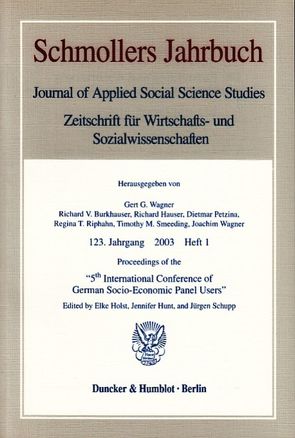
The papers in this special issue of Schmollers Jahrbuch provide a flavor of the work being carried out by the four hundred research teams registered as users of the German Socio-Economic Panel (SOEP). They were presented at the Fifth International Conference of SOEP Users, held in Berlin on the 5th and 6th of July 2002, and represent several fields of social science as well as many countries.
A first set of papers analyzes wage and income inequality and mobility. A new method measuring mobility in different parts of the income distribution is presented in one study, while a second proposes a decomposition technique to investigate changes in wage inequality. A third paper tests hypotheses about the nature of the welfare states by analysing income mobility in three countries: Germany, the Netherlands and the United States.
A second set of papers examines transitions to and from unemployment. They analyze determinants of new job-finding and unemployment duration, including the importance of psychological factors. Aspects of wage determinants play a role in several other papers, for example the negative correlation between maternity leave and the mother's subsequent wage. Another issue related to wage analysis the possible bias arising from individuals' not responding to the wage question.
An additional group of papers revolves around the theme of changes in labor force or personal status and changes in income, documenting, for example, the fall in real equivalent income experienced by women who become widowed. A final group of papers exploits various features of the SOEP to examine topics like savings behavior, wage subsidy schemes and their effect on employment, and the relation between the time a child's parents spent caring for him or her and the child's success at school. Finally, an interesting paper examines smoking behavior over the life cycle across four countries.
Aktualisiert: 2023-05-15
> findR *

Namhafte Fachleute aus Wissenschaft und Praxis präsentieren das Grundlagenwissen der Personalpolitik hinsichtlich der (Un-)Gleichbehandlung von Frauen und Männern. Die 6. Auflage wurde vollständig überarbeitet und um aktuelle Themen erweitert, wie z.B. Frauen in Aufsichtsräten, Gender Pay Gap in Führungspositionen, die entgeltpolitischen Prüfinstrumente Logib(-D) und eg-check.de, Diversity Management in der öffentlichen Verwaltung sowie betriebliche Erfahrungen mit dem AGG.
Aktualisiert: 2023-04-01
Autor:
Sünne Andresen,
Manfred Auer,
Sissi Banos,
Nina Bessing,
Kay Blaufus,
Annelise Burger,
Carola Busch,
Barbara David,
Gudrun Dilg,
Michel E. Domsch,
Sonja Dudek,
Céline Freund,
Marianne Geisser,
Jochen Geppert,
Astrid Gieselmann,
Bettina Graue,
Rainer Gröbel,
Michael Gümbel,
Christoph Habermann,
Axel Haunschild,
Ellen Hilf,
Elke Holst,
Monika Holzbecher,
Monika Huesmann,
Hans Jablonski,
Heike Jacobsen,
Andrea Jochmann-Döll,
Christiane Jüngling,
Rosemarie Kay,
Beate Kessler,
Alexander Klose,
Gudrun-Axeli Knapp,
Susanne König,
Sandra Konstatzky,
Gertraude Krell,
Désirée Ladwig,
Sandra Lewalter,
Annett Losert,
Christine Lüders,
Kathrin Mahler Walther,
Andrea Maiweg,
Andreas Merx,
Bärbel Meschkutat,
Christine Morgenstern,
Ulrich Mückenberger,
Sonja Nielbock,
Ingrid Nikolay-Leitner,
Marion Olthoff,
Renate Ortlieb,
Andrea Puschmann,
Daniela Rastetter,
Birgit Reinhardt,
Eva Maria Roer,
Monika Rühl,
Thomas Sattelberger,
Dagmar Schiek,
Julia Schimeta,
Oliver Schimmelpfeng,
Friedel Schreyögg,
Monika Schulz-Strelow,
Ursula Schwarzenbart,
Barbara Sieben,
Sandra Smykalla,
Hilde Stockhammer,
Karin Tondorf,
Günther Vedder,
Heike Welte,
Regine Winter,
Jutta Wolf,
Artur Wollert

Im Sommer 2016 hat der Deutsche Kulturrat die Studie „Frauen in Kultur und Medien. Ein Überblick über aktuelle Tendenzen, Entwicklungen und Lösungsvorschläge“ veröffentlicht. In der unter der Leitung von Gabriele Schulz erarbeiteten Studie wird für einen Zeitraum von über 20 Jahren untersucht, wie es um die Geschlechtergerechtigkeit im Kultur- und Medienbereich bestellt ist. Dabei wird sowohl die Ausbildungssituation, die Präsenz von Frauen in Führungsetagen von Kultureinrichtungen, die Partizipation von Frauen an der individuellen Künstlerinnen- und Künstlerförderung und anderes mehr für den genannten Zeitraum in den Blick genommen. Ein zentrales Ergebnis der Studie ist, dass trotz stärkerer Präsenz von Frauen in einigen Bereichen von Geschlechtergerechtigkeit nicht die Rede sein kann. Das gilt gleichermaßen für Kulturverbände. Der »Gender Pay Gap« beträgt im Kulturbereich bei den freiberuflich arbeitenden Künstlerinnen erschreckende 24 Prozent. Die Studie hat großes Aufsehen erregt und zwingt zum Handeln. Der Deutsche Kulturrat verpflichtete sich als erste Reaktion auf die Ergebnisse der Studie, bei der geschlechtergerechten Besetzung von Jurys und Auswahlgremien sowie Vorstände bzw. Präsidien mit gutem Beispiel voranzugehen. Das vorliegende Dossier ist ein Teil der politischen Bemühungen, im Kulturbereich mehr Geschlechtergerechtigkeit zu erreichen. Es widmet sich der Rolle der Frauen in der Kulturwirtschaft. Geschlechtergerechtigkeit im Kultur- und Medienbereich zu erreichen, ist für den Deutschen Kulturrat, ein zentrales politisches Handlungsfeld. Im Dossier werden Frauen und Männer aus der Kultur- und Kreativwirtschaft in Form von Texten, Interview und Fotografien porträtiert.
Aktualisiert: 2021-05-07
Autor:
Adriana Altaras,
Sally Below,
Theresa Brüheim,
Valie Export,
Monika Grütters,
Annette Häfelinger,
Elke Holst,
Beatrice Kramm,
Michael Lehmann,
Britta Poetzsch,
Andreas Estevan Schreyer,
Gabriele Schulz,
Monika Schulz-Strelow,
Desirée Vach,
Flea Hoefl von Löhneysen,
Olaf Zimmermann

Namhafte Fachleute aus Wissenschaft und Praxis präsentieren das Grundlagenwissen der Personalpolitik hinsichtlich der (Un-)Gleichbehandlung von Frauen und Männern. Die 6. Auflage wurde vollständig überarbeitet und um aktuelle Themen erweitert, wie z.B. Frauen in Aufsichtsräten, Gender Pay Gap in Führungspositionen, die entgeltpolitischen Prüfinstrumente Logib(-D) und eg-check.de, Diversity Management in der öffentlichen Verwaltung sowie betriebliche Erfahrungen mit dem AGG.
Aktualisiert: 2023-04-04
Autor:
Sünne Andresen,
Manfred Auer,
Sissi Banos,
Nina Bessing,
Kay Blaufus,
Annelise Burger,
Carola Busch,
Barbara David,
Gudrun Dilg,
Michel E. Domsch,
Sonja Dudek,
Céline Freund,
Marianne Geisser,
Jochen Geppert,
Astrid Gieselmann,
Bettina Graue,
Rainer Gröbel,
Michael Gümbel,
Christoph Habermann,
Axel Haunschild,
Ellen Hilf,
Elke Holst,
Monika Holzbecher,
Monika Huesmann,
Hans Jablonski,
Heike Jacobsen,
Andrea Jochmann-Döll,
Christiane Jüngling,
Rosemarie Kay,
Beate Kessler,
Alexander Klose,
Gudrun-Axeli Knapp,
Susanne König,
Sandra Konstatzky,
Gertraude Krell,
Désirée Ladwig,
Sandra Lewalter,
Annett Losert,
Christine Lüders,
Kathrin Mahler Walther,
Andrea Maiweg,
Andreas Merx,
Bärbel Meschkutat,
Christine Morgenstern,
Ulrich Mückenberger,
Sonja Nielbock,
Ingrid Nikolay-Leitner,
Marion Olthoff,
Renate Ortlieb,
Andrea Puschmann,
Daniela Rastetter,
Birgit Reinhardt,
Eva Maria Roer,
Monika Rühl,
Thomas Sattelberger,
Dagmar Schiek,
Julia Schimeta,
Oliver Schimmelpfeng,
Friedel Schreyögg,
Monika Schulz-Strelow,
Ursula Schwarzenbart,
Barbara Sieben,
Sandra Smykalla,
Hilde Stockhammer,
Karin Tondorf,
Günther Vedder,
Heike Welte,
Regine Winter,
Jutta Wolf,
Artur Wollert

Hat Deutschland zwanzig Jahre nach dem Fall der Mauer seine Trennung überwunden? Ist "zusammengewachsen, was zusammengehört"? In diesem Band versuchen Sozialwissenschaftlerinnen und Sozialwissenschaftler diese umstrittene Frage mithilfe empirischer Vergleiche der Entwicklung der Lebensbedingungen und -verläufe in Ost und West zu beantworten. Der Aufbau orientiert sich an den typischen Phasen des Lebensverlaufs: Kindheit, Jugend, Erwachsensein, Altern. Er beleuchtet Aspekte wie Schule und Bildung, Partnerschaft und Familie, Arbeitsmarkt und Erwerbsleben, Lebensstandard und Konsumstile, Zufriedenheiten und Sorgen, soziale Integration und politische Beteiligung. Eine wesentliche Grundlage der empirischen Bilanzierung bildet das SOEP, eine national und international vielfach ausgewertete Längsschnitterhebung, die seit 1984 (zunächst nur in Westdeutschland) jährlich bei denselben Personen und Haushalten durchgeführt wird und 1990 auch auf das Gebiet der ehemaligen DDR ausgedehnt wurde. Zudem werden mehr als 20 weitere sozialwissenschaftliche Datenquellen herangezogen.
Aktualisiert: 2023-03-20
Autor:
Hans-Jürgen Andreß,
Joel Berger,
Petra Böhnke,
Bernhard Christoph,
Claudia Crayen,
Ursula Dallinger,
Claudia Diehl,
Michael Eid,
Joachim Frick,
Dina Frommert,
Johannes Giesecke,
Marco Gießelmann,
Wolfgang Glatzer,
Jan Goebel,
Markus Grabka,
Steffi Grimm,
Roland Habich,
Andreas Hadjar,
Armando Häring,
Ruth Hasberg,
Richard Hauser,
Ralf Himmelreicher,
Elke Holst,
Denis Huschka,
Sabine Keller,
Thomas Klein,
Dirk Konietzka,
Peter Krause,
Michaela Kreyenfeld,
Martin Kroh,
Bärbel-Maria Kurth,
Thomas Lampert,
Frieder Lang,
Stefan Liebig,
Torsten Lietzmann,
Ulman Lindenberger,
Henning Lohmann,
Maike Luhmann,
Carina Marten,
Karl Ulrich Mayer,
Katja Möhring,
Andreas Motel-Klingebiel,
Heinz-Herbert Noll,
Ilona Ostner,
Margund K. Rohr,
Edeltraud Roller,
Wiebke Rösler,
Heinz Rothgang,
Christian Schmitt,
Harald Schoen,
Norbert Schreiber,
Julia Simonson,
Heike Solga,
Johannes Stauder,
Clemens Tesch-Römer,
Heike Trappe,
Ingrid Tucci,
Rainer Unger,
Roland Verwiebe,
Gert Georg Wagner,
Jenny Wagner,
Bernd Wegener,
Stefan Weick,
Michael Windzio,
Christina Wübbeke,
Michael Wurm,
Tanja Zähle,
Thomas Ziese
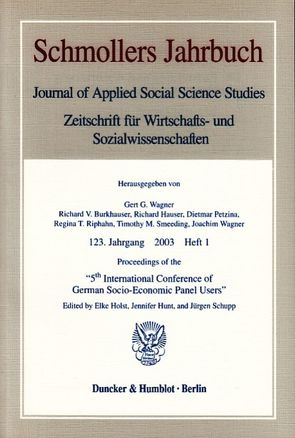
The papers in this special issue of Schmollers Jahrbuch provide a flavor of the work being carried out by the four hundred research teams registered as users of the German Socio-Economic Panel (SOEP). They were presented at the Fifth International Conference of SOEP Users, held in Berlin on the 5th and 6th of July 2002, and represent several fields of social science as well as many countries.
A first set of papers analyzes wage and income inequality and mobility. A new method measuring mobility in different parts of the income distribution is presented in one study, while a second proposes a decomposition technique to investigate changes in wage inequality. A third paper tests hypotheses about the nature of the welfare states by analysing income mobility in three countries: Germany, the Netherlands and the United States.
A second set of papers examines transitions to and from unemployment. They analyze determinants of new job-finding and unemployment duration, including the importance of psychological factors. Aspects of wage determinants play a role in several other papers, for example the negative correlation between maternity leave and the mother's subsequent wage. Another issue related to wage analysis the possible bias arising from individuals' not responding to the wage question.
An additional group of papers revolves around the theme of changes in labor force or personal status and changes in income, documenting, for example, the fall in real equivalent income experienced by women who become widowed. A final group of papers exploits various features of the SOEP to examine topics like savings behavior, wage subsidy schemes and their effect on employment, and the relation between the time a child's parents spent caring for him or her and the child's success at school. Finally, an interesting paper examines smoking behavior over the life cycle across four countries.
Aktualisiert: 2023-04-15
> findR *
MEHR ANZEIGEN
Bücher von Holst, Elke
Sie suchen ein Buch oder Publikation vonHolst, Elke ? Bei Buch findr finden Sie alle Bücher Holst, Elke.
Entdecken Sie neue Bücher oder Klassiker für Sie selbst oder zum Verschenken. Buch findr hat zahlreiche Bücher
von Holst, Elke im Sortiment. Nehmen Sie sich Zeit zum Stöbern und finden Sie das passende Buch oder die
Publiketion für Ihr Lesevergnügen oder Ihr Interessensgebiet. Stöbern Sie durch unser Angebot und finden Sie aus
unserer großen Auswahl das Buch, das Ihnen zusagt. Bei Buch findr finden Sie Romane, Ratgeber, wissenschaftliche und
populärwissenschaftliche Bücher uvm. Bestellen Sie Ihr Buch zu Ihrem Thema einfach online und lassen Sie es sich
bequem nach Hause schicken. Wir wünschen Ihnen schöne und entspannte Lesemomente mit Ihrem Buch
von Holst, Elke .
Holst, Elke - Große Auswahl an Publikationen bei Buch findr
Bei uns finden Sie Bücher aller beliebter Autoren, Neuerscheinungen, Bestseller genauso wie alte Schätze. Bücher
von Holst, Elke die Ihre Fantasie anregen und Bücher, die Sie weiterbilden und Ihnen wissenschaftliche Fakten
vermitteln. Ganz nach Ihrem Geschmack ist das passende Buch für Sie dabei. Finden Sie eine große Auswahl Bücher
verschiedenster Genres, Verlage, Schlagworte Genre bei Buchfindr:
Unser Repertoire umfasst Bücher von
- Holste genannt Göcke, Benedikt
- Holste, Alexander
- Holste, Anna-Lena
- Holste, Astrid
- Holste, Birgit
- Holste, Christine
- Holste, F.
- Holste, Friedrich
- Holste, Heiko
- Holste, Jan Hauke
Sie haben viele Möglichkeiten bei Buch findr die passenden Bücher für Ihr Lesevergnügen zu entdecken. Nutzen Sie
unsere Suchfunktionen, um zu stöbern und für Sie interessante Bücher in den unterschiedlichen Genres und Kategorien
zu finden. Neben Büchern von Holst, Elke und Büchern aus verschiedenen Kategorien finden Sie schnell und
einfach auch eine Auflistung thematisch passender Publikationen. Probieren Sie es aus, legen Sie jetzt los! Ihrem
Lesevergnügen steht nichts im Wege. Nutzen Sie die Vorteile Ihre Bücher online zu kaufen und bekommen Sie die
bestellten Bücher schnell und bequem zugestellt. Nehmen Sie sich die Zeit, online die Bücher Ihrer Wahl anzulesen,
Buchempfehlungen und Rezensionen zu studieren, Informationen zu Autoren zu lesen. Viel Spaß beim Lesen wünscht Ihnen
das Team von Buchfindr.









